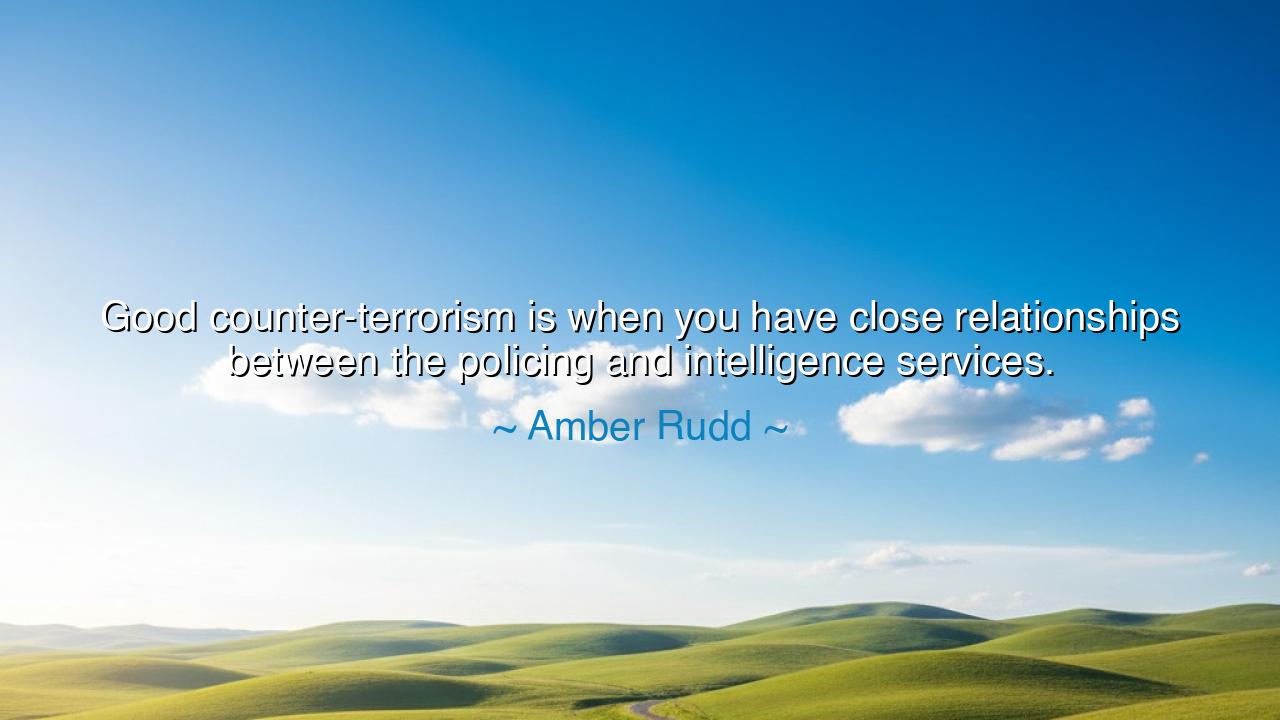
Good counter-terrorism is when you have close relationships
Good counter-terrorism is when you have close relationships between the policing and intelligence services.






In the powerful words of Amber Rudd, "Good counter-terrorism is when you have close relationships between the policing and intelligence services," we are reminded of the critical importance of collaboration and unity in facing threats to national security. Rudd speaks to a truth that has long been recognized in both modern and ancient strategies for defense: that no force, no matter how mighty, can stand alone in the face of complex threats. True strength comes not from isolated efforts but from the synergy of different entities working together, each contributing its expertise and perspective to address the multifaceted challenges of terrorism. Policing and intelligence are not separate endeavors but complementary forces that, when combined, create a much stronger defense against those who seek to harm.
The ancient world offers countless examples of the power of collaboration in the face of external threats. In the time of Sparta, the Spartan warriors were renowned not only for their individual courage but for their unwavering teamwork. The phalanx formation, a closely-knit formation of warriors standing shoulder to shoulder, depended on each soldier’s commitment to both their individual role and the collective mission. Without trust and cooperation between them, the formation would falter. Similarly, in counter-terrorism, the trust and cooperation between police and intelligence services are the foundation upon which successful strategies are built. Just as Spartans fought as one unit, these modern forces must also act in unison, each playing its part to protect the society they serve.
Consider the example of World War II, when the Allied forces—composed of nations with varying military strategies and resources—had to work together in a unified effort to defeat the Axis powers. The success of the Allies was not in the superiority of any one nation’s military, but in the seamless collaboration between different forces: police, military, and intelligence services were all integrated in the effort to outmaneuver the enemy. The British Special Operations Executive (SOE) worked closely with MI5, military units, and the local resistance movements to coordinate attacks and gather intelligence. Without these close-knit relationships, the outcome of the war could have been vastly different. This same principle of collaboration between forces applies to modern counter-terrorism efforts, where intelligence must inform policing, and vice versa, to respond to threats quickly and effectively.
This unity between intelligence and policing can also be seen in the actions following the 9/11 attacks, where the lessons learned about the dangers of fragmented approaches were applied. In the aftermath of those tragic events, many governments around the world recognized that counter-terrorism required a comprehensive and integrated approach. Intelligence services, such as the CIA and FBI, learned to share information and work together more fluidly. The result was the formation of units like the Department of Homeland Security, which united the efforts of intelligence, policing, and emergency services under one cohesive strategy. This change highlighted the importance of cooperation across sectors to respond to evolving threats, much like the Allied forces working together to defeat a common enemy.
The lesson from Rudd’s words, and from historical examples, is clear: collaboration is the key to success in confronting complex and multifaceted challenges. Whether in the defense against terrorism, in warfare, or in any other form of collective struggle, the ability to work together with trust and shared purpose is what ensures the protection and success of the greater whole. Policing and intelligence services, though specialized in their own fields, must not work in silos. They must combine their resources, knowledge, and strategies, recognizing that in the face of modern threats, unity is strength.
In practical terms, we must understand the importance of cooperation and shared purpose in every aspect of our lives, not just in the realm of counter-terrorism. Whether we are working within a team, in business, or in our personal lives, we must learn to combine strengths and resources to achieve common goals. Just as in the military, where individual prowess is valuable but the success of the collective is paramount, so too must we recognize that collaboration—fueled by trust and communication—produces the best outcomes. In our own work and relationships, we should strive to understand the unique contributions of others and find ways to integrate our efforts for the greater good.
The practical action we must take is to foster a culture of cooperation and trust in all our endeavors. By actively listening to those around us, sharing our knowledge, and working collaboratively toward common objectives, we enhance our chances of success. Just as Rudd emphasizes the importance of close relationships between policing and intelligence services, we must recognize the strength of cooperation and the power of collective effort. It is not enough to act alone in the face of challenges—true victory comes when we unite our forces and build bridges, sharing knowledge and wisdom for the benefit of all.






AAdministratorAdministrator
Welcome, honored guests. Please leave a comment, we will respond soon